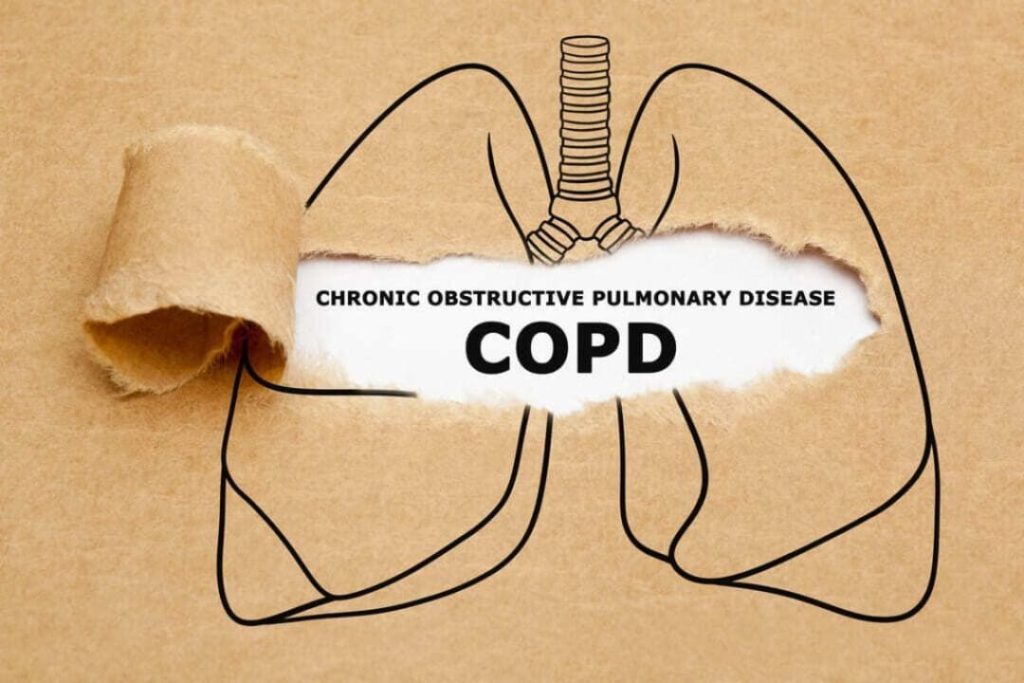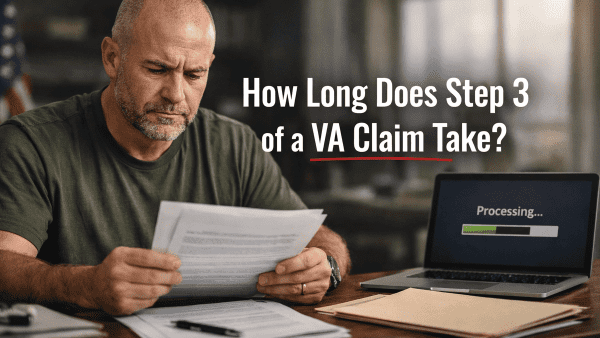Looking for Expert-Level VA Claim Answers?📱Call Us Now! 737-295-2226
Chronic obstructive pulmonary disease (COPD) is a serious lung disease that can make it difficult for veterans to breathe and live normally.
If you’re dealing with COPD, you aren’t alone— based on a 2016 study, the VA found that nearly 4.5% of all veterans have a respiratory condition, and 0.8% (or 140,000 veterans) have COPD directly linked to their military service.
In this guide, we examine COPD VA ratings, how to successfully file a claim for COPD, and much more.
Summary of Key Points
- Chronic obstructive pulmonary disease (COPD) is a lung disease that affects a person’s breathing and ability to perform everyday activities.
- COPD is typically caused by long-term exposure to irritants that damage the lungs.
- COPD VA disability ratings (diagnostic code 6604) range from 10% to 100%, with breaks at 30% and 60%.
- Your VA rating for COPD will depend on the severity of your symptoms, including your forced vital capacity and forced expiratory volume.
Table of Contents

COPD in Veterans
Although any veteran can develop COPD, Gulf War and Post 9/11 veterans are at a higher risk of developing COPD based on exposure to different environmental hazards and contaminants throughout their service.
Here are some causes of COPD for veterans:
- Burn pits – These open-air pits were used to burn trash, chemicals, and other waste materials. Many veterans who served in the Persian Gulf were exposed to the harmful fumes from these burn pits daily.
- Oil well fires – During the first Gulf War, Iraqi soldiers set fire to hundreds of oil wells in Kuwait. The smoke and fumes from these fires put service members at risk for COPD and other respiratory problems.
- Toxic gases – Including Sulfur Dioxide and veteran exposure to the 2003 Sulfur Mine fire in Iraq.
- Particulate matter – A mixture of dust, sand, acids, metals, and other environmental hazards.
- Pollution – Including exposure to vehicle exhaust, industrial fumes, and other airborne contaminants.
- Smoke – Cigarette smoke, secondhand smoke, and other types of smoke can damage your lungs and lead to COPD.
Veterans with long-term exposure to these irritants while serving in the military are at risk for COPD, leading to cardiac or respiratory limitation. Unfortunately, COPD puts you at an increased risk for developing serious diseases like lung cancer and heart disease.

Qualifying for a COPD VA Rating
Unlike many other conditions, COPD is unlikely to improve. The VA is much more likely to grant a permanent rating for your COPD. Let’s look at what it takes to improve your chances for a VA rating for COPD.
To increase your chances of a successful claim for VA disability benefits, you must include these three elements as part of your fully developed claim:
- A current medical diagnosis of COPD
- Evidence of an in-service event or injury that caused or aggravated your COPD
- A medical nexus from a physician that links your COPD to your in-service event (or service connection) (can be a Nexus Letter)
If you have a diagnosis of COPD and you believe you were exposed to harmful toxins or other hazards that caused your COPD while serving, you must prove that your COPD is at least as likely as not caused by your in-service event.
There are several different ways you can service connect your COPD. However, most cases of COPD will either be granted direct service connection or presumptive service connection.
Direct Service Connection
With direct service connection, you must prove a clear link between an incident in the military and your COPD to earn a COPD VA rating.
In addition to medical records and a nexus, showing proof of the event through your military service records can help the VA determine that the event caused your COPD.
Presumptive Service Connection
Thankfully, the VA PACT Act made it much easier for many veterans to show how their service in the Middle East and particulate matter or burn pit exposure caused COPD with presumptive service connection.
A presumptive disability for toxic exposure is one that the VA “presumes” to be service-connected, even if there’s no specific link for service connection.
When you qualify for a presumptive service connection disability, your VA disability claim is MUCH easier to win. All you need to show is that you have COPD and were deployed to one of the eligible areas.
COPD VA Rating: PACT Act
If you were deployed to one of these areas on or after August 2, 1990, you’re eligible for COPD presumptive service connection. You must have performed active military, naval, or air service while assigned to a duty station.
- Bahrain
- Iraq
- Kuwait
- Oman
- Qatar
- Saudi Arabia
- Somalia
- United Arab Emirates
- The airspace above any of these locations
Or if you served on or after September 11, 2001, you’re covered for service in the following locations:
- Afghanistan
- Djibouti
- Egypt
- Jordan
- Lebanon
- Syria
- Yemen
- Uzbekistan
- The airspace above any of these locations
Both chronic bronchitis and COPD presumptive claims have been granted effective dates of October 1, 2023. If a veteran is terminally ill, homeless, in severe financial difficulty, aged 85 or older, or can demonstrate other acceptable causes, August 10, 2022, is the effective date for claims.
VA Disability Ratings for COPD
The VA rates COPD at 10%, 30%, 60%, or 100%, under diagnostic code (DC) 6604, The Schedule of Ratings for the Respiratory System.
VA Disability Rating Chart for COPD
| Diagnostic Code 6604, COPD | VA Rating |
| FEV-1 less than 40 percent of predicted value, or; the ratio of Forced Expiratory Volume in one second to Forced Vital Capacity (FEV-1/FVC) less than 40 percent, or; Diffusion Capacity of the Lung for Carbon Monoxide by the Single Breath Method (DLCO (SB)) less than 40-percent predicted, or; maximum exercise capacity less than 15 ml/kg/min oxygen consumption (with cardiac or respiratory limitation), or; cor pulmonale (right heart failure), or; right ventricular hypertrophy, or; pulmonary hypertension (shown by Echo or cardiac catheterization), or; episode(s) of acute respiratory failure, or; requires outpatient oxygen therapy. | 100% |
| FEV-1 of 40- to 55-percent predicted, or; FEV-1/FVC of 40 to 55 percent, or; DLCO (SB) of 40- to 55-percent predicted, or; maximum oxygen consumption of 15 to 20 ml/kg/min (with cardiorespiratory limit) | 60% |
| FEV-1 of 56- to 70-percent predicted, or; FEV-1/FVC of 56 to 70 percent, or; DLCO (SB) 56- to 65-percent predicted | 30% |
| FEV-1 of 71- to 80-percent predicted, or; FEV-1/FVC of 71 to 80 percent, or; DLCO (SB) 66- to 80-percent predicted | 10% |
How the VA Rates COPD
The VA rates COPD based on factors including:
- Lung function
- How long it takes you to breathe
- How much air you’re inhaling and exhaling
- Your maximum exercise capacity
Your COPD rating is heavily based on breathing tests that measure several different components.
You were likely diagnosed with COPD after you took one of the following tests, and the VA will want to monitor your progress over time, so you can expect to take these several times.
Forced Expiratory Volume in 1 Second (or FEV-1)
FEV-1 is the maximum amount of air you can breathe out in 1 second compared to a healthy person your age.
FEV-1 is shown as a percentage, as you’re being compared to a healthy person like you. A 10% COPD VA rating starts if you can only breathe out 80% of the amount of air of a healthy person.
Forced Vital Capacity
Forced Vital Capacity (FVC) is a test that measures how much air you can exhale after taking a full breath.
Diffusion Capacity of the Lung for Carbon Monoxide (DLCO)
This test measures your body’s ability to transfer oxygen into your red blood cells.
You may also be eligible for a VA disability rating based on one of the following:
- Diffusion Capacity of the Lung for Carbon Monoxide by the Single Breath Method, or DLCO, which measures the lungs’ ability to transfer inhaled air to red blood cells.
- Maximum exercise capacity
- Right heart failure
- Right ventricular hypertrophy
- Pulmonary hypertension
- Episode of acute respiratory failure
- Requirement of outpatient oxygen therapy
>> View Our Guide to VA Pulmonary Function Tests (PFTs)
Filing for VA Disability Benefits
To get started with your COPD VA claim, gather your evidence and submit your intent to file.
There are a few ways to file a VA disability claim, using VA Form 21-526EZ:
- Mailing in or faxing your forms
- In-person at your local regional VA office
Secondary Service Connection
Several secondary conditions can also arise from your COPD, including:
If you’re dealing with any of these conditions due to your COPD, make sure to document your symptoms with a physician to pursue a secondary service connection for disabilities caused by your service-connected COPD. This will ensure you get the VA COPD rating you deserve.
Conclusion
If you’re a veteran living with COPD, you may be entitled to monthly tax-free compensation and VA healthcare benefits—especially if your condition is linked to burn pits, oil fires, toxic exposures, or other service-related hazards.
Thanks to the PACT Act, it’s now easier than ever for many veterans to qualify for presumptive service connection for COPD. Whether your exposure happened decades ago or more recently, the VA must recognize the long-term impact of environmental toxins on your lung health.
But winning your COPD VA claim still takes the right medical evidence, a clear service connection, and a well-documented claim.
Veterans: Want to Chat With a VA Claim Expert?
There’s no better time than today!
If you feel stuck, frustrated, or underrated by the VA, talk to our team now.
Book Your NO-OBLIGATION Discovery Call OR Dial Now: (281) 533-6777

- VA Claims Insider is the #1 most trusted name in VA disability claims.
- Work directly with a VA claims coach who can educate you through the claims process.
- 25,000+ disabled veterans have served in our membership programs since 2016.
- 30% average rating increase for veterans who complete our #1-rated Elite program.
- 4.7/5.0 average rating out of 5,500+ total reviews; over 4,500 5-star reviews.
FAQs | Frequently Asked Questions
What is the average VA rating for COPD?
VA ratings for COPD range from 10% to 100%, depending on the severity of your symptoms and results from breathing tests like FEV-1, FVC, or DLCO. Many veterans are rated at 30% or 60%, but a 100% rating is possible if your condition is severely disabling or requires oxygen therapy.
Is there a VA disability rating for COPD caused by asbestos exposure?
Yes. If your COPD developed as a result of asbestos exposure during military service, you may be eligible for VA disability benefits. The VA recognizes asbestos-related diseases, including lung cancer and mesothelioma, and may grant service connection if your COPD is linked to confirmed exposure.
Is COPD included under the PACT Act?
Yes. COPD is one of the respiratory conditions now easier to claim thanks to the PACT Act. Veterans who served in qualifying locations and timeframes (such as Iraq, Afghanistan, or the Persian Gulf) may now receive presumptive service connection for COPD, streamlining the VA claim process.
Is COPD a presumptive condition for Agent Orange exposure?
No. COPD is not currently considered a presumptive condition for Agent Orange exposure. However, lung cancer is. If you have a diagnosis of both, you may still qualify for VA benefits based on your lung cancer or another related condition.
What is Chronic Obstructive Pulmonary Disease (COPD)?
COPD is a progressive lung disease that makes breathing increasingly difficult over time. It includes chronic bronchitis and emphysema, and symptoms may include coughing, shortness of breath, wheezing, and fatigue. While not curable, COPD can be managed with treatment and rated by the VA for disability compensation.
What are the symptoms of COPD?
Veterans with COPD may experience shortness of breath, wheezing, chest tightness, chronic coughing (often with mucus), and frequent respiratory infections. Advanced COPD can lead to weight loss, swelling in the legs, and low oxygen levels, severely impacting your quality of life.
What is the VA rating for emphysema?
Emphysema is rated under Diagnostic Code 6603 and follows the same respiratory rating criteria as COPD. The VA may assign a rating of 10%, 30%, 60%, or 100%, depending on pulmonary function test results and overall impact on your health.
What causes COPD in veterans?
COPD is caused by long-term exposure to harmful substances that damage the lungs, including burn pits and particulate matter. Veterans often develop COPD due to burn pit exposure, smoke inhalation, toxic chemicals, oil well fires, or other airborne hazards encountered during active duty.
Can you get a VA rating for COPD if you smoke?
Yes, but it can be challenging. The VA may try to attribute your COPD to smoking rather than military service. To win your claim, you’ll need strong medical evidence showing that your COPD is at least as likely as not caused by your service (regardless of your smoking history). A nexus letter from a qualified medical provider can make a big difference in these cases. Pro Tip: If you’re a smoker, your medical nexus becomes even more critical for your COPD VA claim.
Content Reviewed By

Quality Assurance Team
The Quality Assurance (QA) team at VA Claims Insider has extensive experience researching, fact-checking, and ensuring accuracy in all produced content. The QA team consists of individuals with specialized knowledge in the VA disability claims adjudication processes, laws and regulations, and they understand the needs of our target audience. Any changes or suggestions the QA team makes are thoroughly reviewed and incorporated into the content by our writers and creators.
Author

Kelly Olone
Kelly Olone is a military spouse who earned her degree in Psychology from Florida International University. After working in the non-profit sector for several years, she turned to her passion for writing. She aims to contribute to a better understanding of the valuable benefits that veterans deserve. As a mom, Kelly navigates the delicate balance between deadlines and bedtime stories with finesse.



